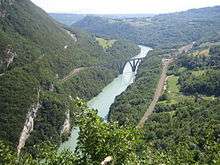Defile (geography)
In geography, a defile is a narrow pass or gorge between mountains or hills. The term originates from a military description of a pass through which troops can march only in a narrow column or with a narrow front.[1] On emerging from a defile (or something similar) into open country, soldiers are said to "debouch".

Background
In a traditional military formation, soldiers march in ranks (the depth of the formation is the number of ranks) and files (the width of the formation is the number of files), so, if a column of soldiers approaches a narrow pass, the formation must narrow, and so the files on the outside must be ordered to the rear (or to some other position) so that the column has fewer files and more ranks. The French verb for this order is défiler,[2] from which the English verb comes, as does the physical description for a valley that forces this manoeuvre.[3]
Defiles of military significance can also be formed by other physical features that flank a pass or path and cause it to narrow, for example impassable woods and rivers. At the Battle of Agincourt, a defile formed by the woods of Agincourt and Forecourt caused a choke point for the French army and aided the English in their victory over the French.[4]
Some defiles have a permanent strategic importance and become known by that term in military literature. For example, the military historian William Siborne names such a geographic feature in France near the frontier with Germany in his book Waterloo Campaign 1815:
On the following day, General Rapp fell back upon the Defile of Brümath; but this he quitted in the night, and took up a favourable position in the rear of the Suffel, near Strasburg.
— William Siborne[5]
See also
- Battle of Cerro Gordo – Battle of the Mexican-American War
- Battle of Thermopylae – Persians defeated Greek states in 480 BC
- Canyon – Deep ravine between cliffs
- Draw (terrain) – Terrain feature formed by two parallel ridges or spurs with low ground in between
- Gully – Landform created by running water eroding sharply into soil
- Ravine – Small valley, which is often the product of streamcutting erosion
- Valley – Low area between hills, often with a river running through it
- Water gap
- Wind gap
- Fulda Gap
References
- "Defile". Oxford English Dictionary (1).
- Oxford English Dictionary "defile" [etymology] "F. défilé (17th c.), ppl. n. from défiler to DEFILE
- Oxford English Dictionary "defile" n. 2.
- Encyclopædia Britannica Eleventh Edition. "Agincourt". "The battle was fought in the defile formed by the wood of Agincourt and that of Tramecourt, at the northern exit of which the army under d'Albret, constable of France, had placed itself so as to bar the way to Calais against the English forces..."
- Siborne, William. Waterloo Campaign 1815, Fourth Edition, Birmingham, 34 Wheeleys Road. Supplement section (p. 772)